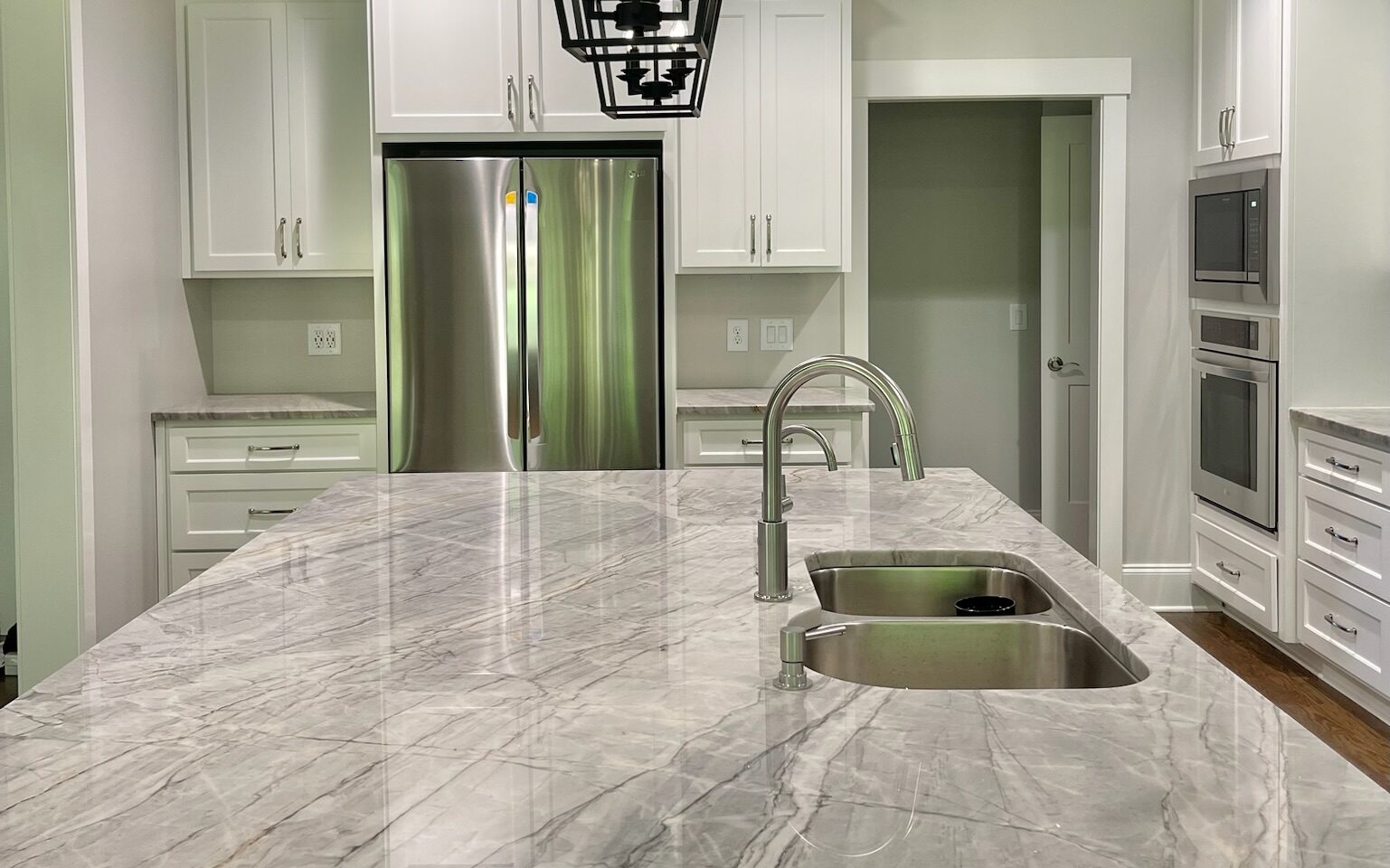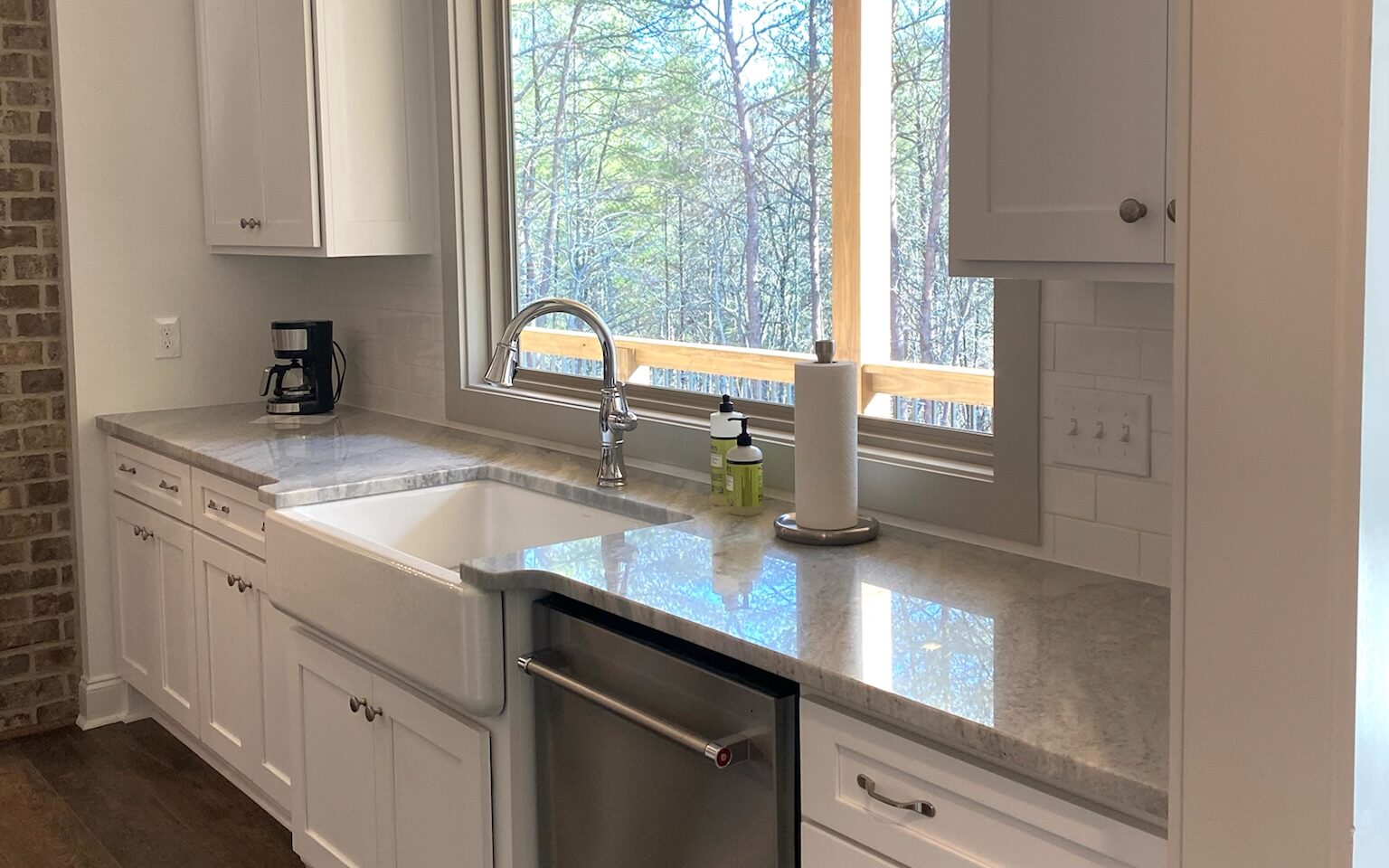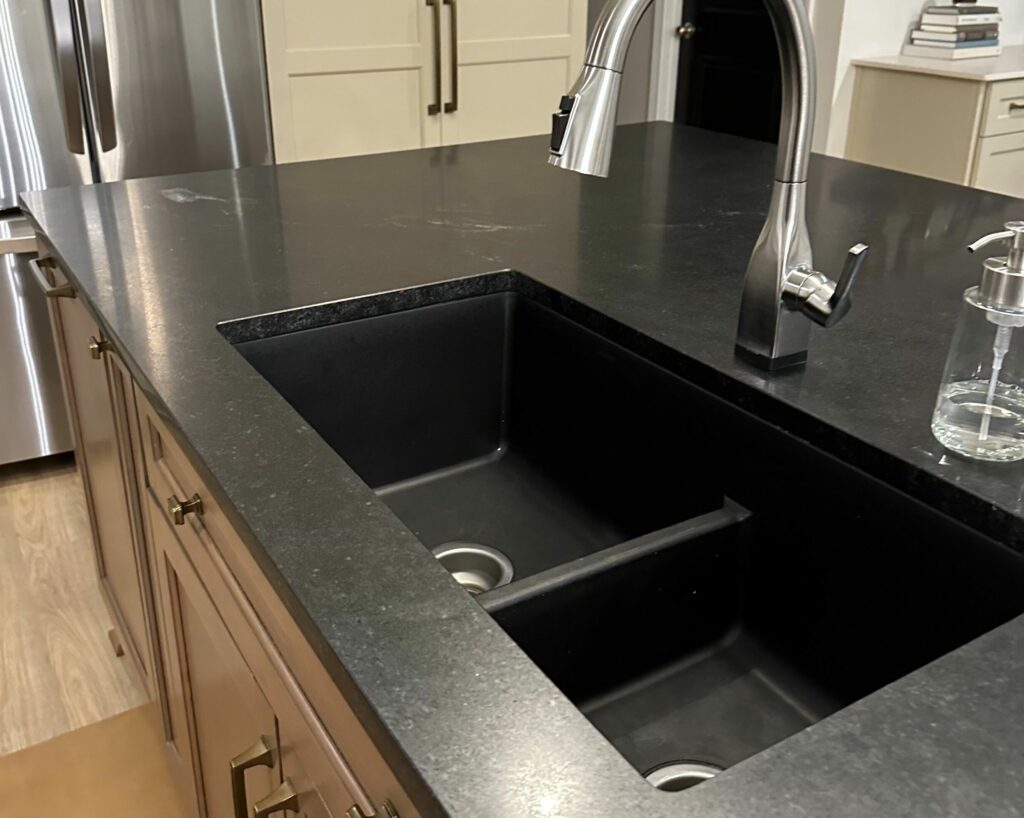When choosing the perfect sink for your kitchen, bathroom or bar, it is important to understand how to clean and upkeep the sink’s material – allowing you to have a stunning, shiny sink for years to come. From dos to don’ts, the All Concepts team has all the tips and tricks to keep your sink in tip-top condition!

Stainless Steel
When it comes to stainless-steel sinks, there is no such thing as cleaning too much! While corrosion and rust are factors to watch for in stainless steel, frequent cleaning will never cause wear and tear. For many, cleaning and maintaining their stainless-steel sink is mainly for aesthetic purposes, as well as corrosion prevention.
Stainless steel sinks make the perfect addition to a kitchen or bar because of the ease of keeping it stain-free! Here are a few tips for keeping your stainless-steel sink beautiful and shiny:
- The best way to maintain a clean and aesthetically pleasing stainless-steel sink is to blend a daily after-use cleaning routine with a weekly deeper cleaning routine.
- We recommend using a gentle cleaner, such as Bar Keepers Friend or Bon Ami, with warm water and a clean cloth or sponge to effectively clean the surface.
- Immediately rinse the surface of the sink with clean, hot water to wash away any harmful residue and leave the sink with a glimmering glow.
- Wipe down the sink with a dry towel to avoid water or rust spots.
For an additional shine, try rinsing your stainless-steel sink with club soda! Baking soda is also a good alternative to washing away stuck-on grease and hard water deposits.
While stainless-steel sinks are hard to wear down, there are a couple of mistakes to avoid when cleaning, including:
- DO NOT scrub the sink with steel wool or carbon steel brushes as they will leave behind iron particles that could potentially cause corrosion or rust.
- To avoid dullness and bacteria on your sink’s surface, it is essential to NEVER dry out your towels, sponges and cloths in or on the sink.
- Knives and other sharp objects should NEVER directly touch the surface of the sink as they may cause serious damage.
- DO NOT leave cast iron or steel cookware in the sink for a long period. The mixture of moisture and iron can cause corrosion and rust.

Porcelain Sinks
Our standard vanity sinks – both oval and rectangular – are made of porcelain, and this durable material is consistently the most popular bathroom sink option. Porcelain is a hard, non-porous material that stands up to daily wear and tear, as well as regular cleaning.
Here are the steps to care for a porcelain or porcelain-coated sink:
- Use a soft cloth or sponge with a mild cleanser diluted with water to wipe down the sink.
- Be sure to completely rinse away the soapy residue after cleaning.
- Once clean, dry the surface with a soft, dry cloth.
- Use hydrogen peroxide to diminish the appearance of scratches or stains if they occur on a porcelain sink.
While porcelain sinks are incredibly durable, there are a few things to avoid when cleaning:
- DO NOT use an acidic or abrasive cleaner or harsh scrubbing tool.
- Steer clear of scouring powders.
- To avoid chips or scratches in the porcelain, avoid dropping heavy items into the sink.
- If rinsing dyes, paints or other materials that could leave a stain, be sure to keep the water running until it’s all gone to prevent the porcelain from absorbing any of the colors.

Enameled Cast Iron
Cast iron sinks are pleasing to the eye, extremely durable and super easy to clean! While they may look like porcelain, enameled cast iron sinks boast a heavy, iron foundation with a hard shelling – giving a durable-yet-glossy finish.
Here are the best ways to clean your enameled cast iron sink:
- We recommend using a non-abrasive cleaner with hot water and a clean cloth or sponge to effectively clean the sink’s surface.
- Use a mixture of baking soda and water to remove any tough stains.
- Be sure to rinse the sink immediately and thoroughly after every use and dry it completely to avoid water marks.
Although enameled cast iron sinks are easy to clean, there are a few practices to avoid, including:
- DO NOT scrub the sink with steel wool or carbon steel brushes as they will potentially damage the sink’s surface.
- To avoid hard stains on the surface of the sink, NEVER leave elements such as berries, coffee, tea bags or other potent liquids in the sink.
- DO NOT leave cast iron or steel cookware in the sink for a long time as it could scuff the surface.
- Our preferred enameled cast iron sink is the Kohler Whitehaven. Kohler offers a Cast Iron Cleaner that does a wonderful job removing pot marks, rust and other blemishes to clean and restore enameled cast iron surfaces.

Granite Composite Sinks
Designed with durability as the top priority, granite composite sinks are the perfect option when choosing a sink for your kitchen! To keep your granite composite sink looking its best, it is crucial to clean it routinely while utilizing the following tips:
- The best way to maintain a clean and aesthetically pleasing granite composite sink is to regularly wipe down the sink with hot, soapy water – you can do this daily or every other day.
- For tough stains and hard water, we recommend using a baking soda mixture with a soft sponge or clean cloth to deep clean the surface.
- Immediately rinse out the sink with clean, hot water to wash away any residue.
- Wipe down the sink with a dry towel to avoid water marks.
- Most granite composite sinks sourced through All Concepts are BLANCO sinks – they offer a great cleaning product called BLANCOCLEAN Daily+ Sink Cleaner. This product is gentle enough for regular use and tough enough to provide a deeper clean to reduce limescale and soap scum buildup.
In addition to practicing the above tips, it is important to avoid the following mistakes when maintaining your granite composite sink:
- DO NOT scrub the sink with carbon steel brushes or steel wool as they will potentially damage the sink’s surface.
- To avoid tough stains on the surface of the sink, NEVER leave dark foods or liquids in the sink.
- DO NOT leave cast iron or steel cookware in the sink for a long time as it could scratch the surface.
Ceramic Sinks
Much like porcelain, ceramic offers a hard, shiny, non-porous surface that makes a beautiful sink. However, ceramic is more prone to chipping as it’s not as hard as porcelain. Despite the fact that you have to be a little gentler with a ceramic sink, it’s an increasingly popular option thanks to its ability to be created in a wide range of styles and colors.
Ceramic sinks are super resistant to discoloration and scratches, but they still require regular basic maintenance. Here is how we recommended caring for your ceramic sink:
- Use an all-purpose cleaning or small amount of mild dish soap with a soft sponge to maintain your ceramic sink.
- Once your sink is clean, be sure to thoroughly dry it.
- To brighten and whiten your sink, coat it with lemon juice from fresh lemon slices and let it sit for 30 minutes. Then, rinse thoroughly.
If your ceramic sink needs a deeper cleaning, use a sprinkling of baking soda around the sink to remove any buildup or grime. You can also use toothpaste on a soft, damp sponge rubbed in circular motions if you don’t have baking soda on hand!
In the event stains occur on your ceramic sink, apply a mixture of vinegar or hydrogen peroxide and cream of tartar to the stain. Wait 10 minutes, then remove it with a soft sponge. Or, spray a bleach solution mixed with water on the surface. Let it sit for 10 minutes, then rinse clean.
Caring for your ceramic sinks is fairly simple, be sure you avoid using any scouring materials or highly concentrated drain cleaners.
Interested in learning more about our go-to sink selections? View them here in our Concept Collection Countertop Catalog!
For more information on how to hire All Concepts for all your sink, cabinet or countertop needs, call us at 770-534-0942 or contact us here.
